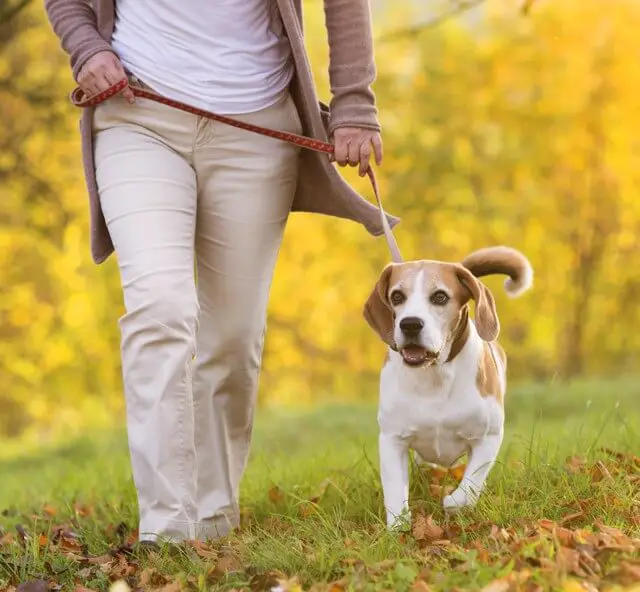An overview of the role
Dog walkers collect dogs from their owners’ houses, exercise them for a pre-arranged length of time and then return them, washing them to remove any dirt picked up during the walk if necessary.
A dog walker often offers a variety of different services, such as:
- Private – this involves an on or off-lead walk for a single dog, who cannot be walked as part of a pack
- Group – this involves a walk for a group of dogs, usually on the lead
- Outing – this involves an off-lead run and play, usually in a more rural setting with a group of dogs
What are the responsibilities of a dog walker?
Responsibilities of a dog walker include:
- Walking dogs on and/or off the lead and supervising them while they exercise
- Playing with dogs for exercise purposes (throwing balls/sticks and so on)
- Collecting dogs from their owners’ houses
- Washing and drying muddy pets at the end of a walk if necessary
- Doing other tasks that your customers may have requested, such as feeding dogs or brushing them
- Completing paperwork, such as daily report cards for your customers
- Advertising your services

I love it. I like dogs and I love walking, because I find it therapeutic. There’s a rhythm to walking, you can lose yourself in it and as I walk I daydream and work things through in my head.
Mark Forsythe, Professional Dog Walker 1
What are the key skills required by a dog walker?
Key skills for a dog walker include:
- An excellent knowledge of animal behaviour and sensitivity to the requirements of dogs
- An outgoing, active personality
- Excellent interpersonal and communication skills
- Good timekeeping skills
- Business acumen
- Flexibility – customers might need you to undertake last-minute work occasionally
What qualifications does a dog walker require?
No formal qualifications are needed in order to become a dog walker. However, any training in animal care will stand you in good stead both in practical terms and when you are advertising your services.
If you have access to your customers’ keys and are going into their house to pick up and drop off their dog for walks, a Criminal Record Check is mandatory. This is a small expense but will make your job as a dog walker much easier and more profitable.
It is also worth being trained in dog first aid in case of emergencies while walking. This is something that your customers will really appreciate – every dog owner wants to know their pet is in safe hands. Basic first aid kits for dogs are easy to come by and you can take them with you on your walk.
You may wish to expand your repertoire and make more money by completing additional qualifications, such as grooming/trimming and dog training courses.
What are the prospects and salary of a dog walker?
The pay of a professional dog walker depends largely on the area in which they are working, but it can be anywhere between £5 and £15 per hour. Dog walkers in affluent urban or exurban (commuter-belt) areas will be working for professionals and have the chance to earn more.
How much a dog walker earns is also dependent on factors such as their working hours and how many dogs they walk and as such it is highly variable. Their salary could be anywhere between £9,000 and £32,000 per year.

By the end of the day, I’m covered in sweat and 15 different types of fur. But the rewards of being greeted by one wagging tail after another as part of the job makes it worth every second.
Allison Gray, Professional Dog Walker 3
Steps to become a dog walker:
-
Decide if you are going to set up freelance:
There are a few options to finding a career as a dog walker. Firstly you can join a company that provides a dog walking service or you can establish yourself as a freelance walker by setting up your own dog walking business.
-
Qualifications:
If you are freelancing, it is worth obtaining a level 2 or 3 qualification to meet the Defra Animal Activity Licence to build your credibility and trust as a dog walker.
-
Build up your dog walking skills:
To gain some experience with dog walking you can start small by walking your neighbours dogs and helping families so that you can practice and build up your skills as a dog walker
-
Learn about marketing to reach clients:
If you are looking to set up a dog walking business it is important to research your competitors and see how you can set your service apart from them, e.g do they offer dog grooming services, or pet sitting?
Related Occupations
References:
1. https://www.independent.co.uk/student/career-planning/getting-job/i-want-your-job-dog-walker-1971690.html
2. A Day in the life of a Dog Walker, Petaholics NYC, https://www.youtube.com/watch?v=VyykKYDZFpQ
3. https://www.petful.com/behaviors/a-day-in-the-life-of-a-dog-walker/

